#swedish composer
Explore tagged Tumblr posts
Text
youtube
Johan Joachim Agrell (1701-1765) - Oboe Concerto in B-Flat Major: II. Adagio ·
Lars Henriksson, oboe
Conductor: Andrew Manze
Orchestra: Concerto Copenhagen
8 notes
·
View notes
Text
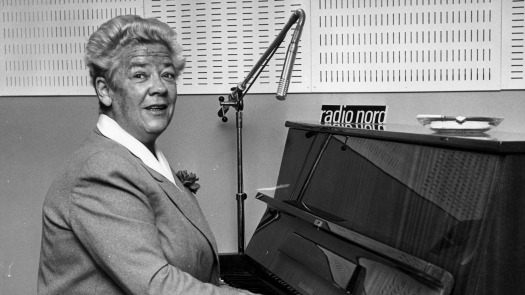
Kai Gullmar (deceased)
Gender: Female
Sexuality: Lesbian
DOB: 2 April 1905
RIP: 25 March 1982
Ethnicity: White - Swedish
Occupation: Composer, musician, singer, songwriter, actress
Note: Wrote music for more than 40 films between 1937 and 1960
#Kai Gullmar#lesbian history#lgbt history#lgbtq#butch#female#lesbian#1905#rip#historical#white#swedish#composer#musician#singer#songwriter#actor
68 notes
·
View notes
Text
Wille and Simon are at the castle their final night before returning to Hillerska after the Jubilee day speech and Wille takes Simon's hand and starts to direct him to a wing they haven't been to yet. Simon follows along a little bemused because Wille seems so intent, but they reach a door that Wille pushes open to reveal a beautiful Fazioli grand piano in an airy sitting room. Wille tugs Simon over to the piano stool and they sit together. Wille's gaze darts around before settling on Simon's gaze and asking "will you play the song for me?" And Simon says "you mean the one from the ball?" And Wille nods his head and Simon huffs out a little laugh and says "it's not very happy Wille" and he replies "I don't care, you wrote it about me. No one's ever done that before" so Simon sings it for him while Wille closes his eyes and gently sways. When he finishes Wille opens his eyes and grins, clapping for Simon who laughs and hides his head in Wille's shoulder. He sits up and looks at Wille and says "now you play something for me." And Wille groans a little and says "but you're so much better than me, I was just made to learn for ages because apparently that's something a prince has to do." And Simon says "well at least you can read music! Surely you can still remember something" and Wille looks a little nervous but nods and settled his hands over the keys. He plays Simon Poulenc, and his fingers are sure in the movement. Simon almost stops breathing from concentrating on the sound Wille makes. When the piece finishes he just turns to Wille and stares before gently shoving him and saying "what the fuck Wille I thought you said you weren't very good!" And Wille goes pink and says "I'm not, I don't have the music... In me like you do. I mean 11 years of learning and that's all I've got to show for it? You've never had one lesson and you write these incredible songs!" And Simon just has to laugh because he knows Wille won't change his mind. Instead, he turns and says "maybe we could write a song together? With your theory and my so called innate talent, we could be the new Leonard and McCartney!" And Wille just barks out a laugh and says "oh yeah, you really think so? Well guess we better get started!"
As they laugh and make up silly lyrics and melodies together, Kristina walks by and stops when she hears them. She pokes her head around to glance at Wille and Simon at the piano, smiling and teasing each other. Her façade drops slightly, seeing for the first time her son interacting with someone who wasn't Erik so carefree and brightly. Something clicks inside her, and she realises that Simon isn't going anywhere. This isn't some little sexual exploration that Wille would eventually grow out of. Her son was in love, and nothing would change that.
#he plays suite française d'apres Claude Gervaise: Pavane#listen#its beautiful#young royals#yr s3#wilmon#prince wilhelm#simon eriksson#wilhelm x simon#wille young royals#yr#i tried to think of a swedish composer that would be appropriate but the more modern ones are very angular and i dont think Wille would be#very into that kinda music#queen kristina
234 notes
·
View notes
Text
i love having too much free time on hand
#fun fact i know the enture chorus to this song word to word#idek swedish but i still know it word to word#i used to have a phase in 2022 where it was stuck in my head for weeks#i listened to it on loop 24/7#im not joking#isnt that great#my art#classical composers#classical music#prokofiev#sergei prokofiev#shostakovich#dmitri shostakovich
81 notes
·
View notes
Text


M'lle Christina Nilsson by S J Mason
"Here we heard for the first time Christine Nilsson, who made her debut in " Traviata," at the Theater Lyrique. The beautiful, slender form, the clear, bell like voice of the young artiste secured for her immediately the warmest sympathies of the public , which Adelina, among the first, encouraged by her liberal applause. Christine Nilsson achieved an overwhelming success with " The Queen of the Night, " which, after the execution of the great air, which she sang in the style of the original music , increased to an imposing triumph. Madame Carvalho, the wife of the director, was a Pamina of the very first rank. Accustomed herself to triumph, the situation imposed by the role of Pamina did not seem especially to please the artiste, as, during the entire delivery of the great air, she was obliged to stand stock still at the side of her dazzling Madame Mamma, and , in addition , be the witness of the countless outbreaks of applause on the part of the public. The full house , however, was for the Directress Carvalho balsam for the wounds which the salvos of applause for the " Queen of the Night " gave her; and so well did Christine Nilsson fill this so fatal pause for Pamina that Madame Carvalho smiled upon her in the most friendly manner."
From Fourteen Years with Adelina Patti (1884) by Louisa Lauw
#classical music#opera#music history#bel canto#composer#classical composer#aria#classical studies#maestro#chest voice#Christina Nilsson#Christine Nilsson#The Swedish Nightingale#Swedish Nightingale#The Nightingale#dramatic coloratura soprano#soprano#classical musicians#classical musician#classical history#historian of music#history of music#musician#musicians#diva#prima donna#La Traviata#Giuseppe Verdi#Die Zauberflöte#Wolfgang Amadeus Mozart
7 notes
·
View notes
Text
Every composer when they see Ludwig Göransson is also nominated for Best Original Score
#ludwig goransson#golden globes#golden globes 2024#oppenheimer#that swedish man just composes scores that change lives#oscars 2024#oscars
24 notes
·
View notes
Text

2 notes
·
View notes
Text
One of Swedens most famous authors is children's book author Astrid Lindgren (1907-2002). Her perhaps most famous character of all is Pippi Långstrump, Pippi Longstocking in English. The books about Pippi is one of the most translated books in the world, available in around 100 languages.
The books were released during the 40's, and in 1969 a TV-series adaption came out. In the 70's, two movies were released, with the same actors and director. The theme song Här kommer Pippi Långstrump (Here comes Pippi Longstocking) was composed by the incredibly well renowned jazz musician Jan Johansson and recorded sung by the actress playing Pippi, Inger Nilsson. Johansson died tragically in a car accident in 1968, before the series were released. Most subsequent Astrid Lindgren songs were written by Georg Riedel.
The song is sung from Pippi's perspective, describing herself and urging her friends to have a great time with her. The lyrics are also peppered with the nonsensical "tjolahopp tjolahej tjolahoppsansa". A couple of years ago, an "official music video" was published on Youtube, consisting of clips from the series and movies:
youtube
#swedish music#svensk musik#music#lyrics in swedish#svenska#langblr#pippi långstrump#pippi longstocking#astrid lindgren#jan johansson#jazz composers#children's music#60's#inger nilsson#Spotify#Youtube
25 notes
·
View notes
Text
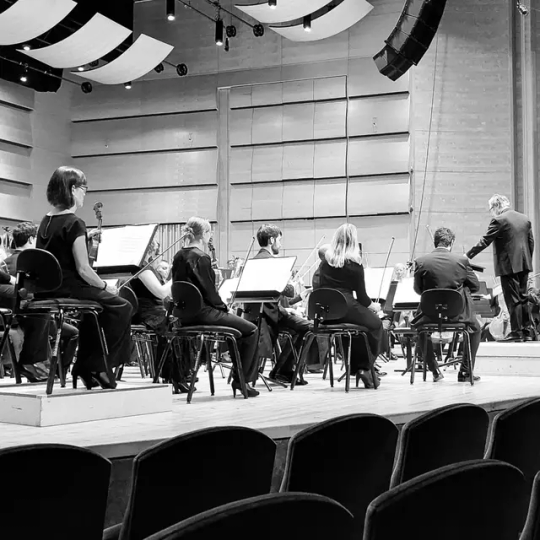

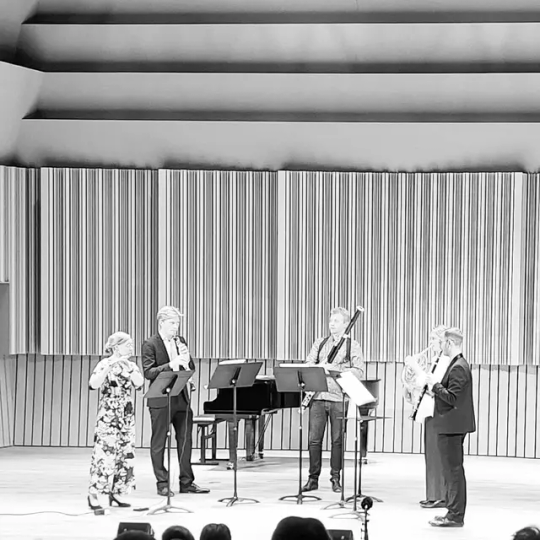
I want to extend my deepest gratitude to Norrköping Symphony Orchestra (SON), Michael Bartosch, Östgöta Kammarkör, Jakob Grubbström and Crusellkvintetten for a successful collaboration during the 2024 edition of Norrköpingsljud!
I also want to thank the organizers of this festival for including my works this year, I has been especially fun to work with SON, an orchestra which I grew up listening to while living in Norrköping. I sincerely hope that we'll have the opportunity to work together again soon!
#composer#classical#erikvaldemarsköld#contemporary#composition#classicalmusic#contemporarymusic#classical music#newmusic#concert#musicians#music for orchestra#music festival#contemporary music#contemporary music festival#Norrköpingsljud#norrköping#swedish composers#swedish art#swedish music#nordic composers#nordic mythology#norse mytology#nordic music
0 notes
Text





Happy Birthday Ludwig Göransson!
0 notes
Text
ABBA - Waterloo 1974
"Waterloo" is a song by Swedish pop group ABBA, with music composed by Benny Andersson and Björn Ulvaeus and lyrics written by Stikkan Anderson. It is first single of the group's second studio album of the same name, and their first under the Atlantic label in the US. This was also the first single to be credited to the group performing under the name ABBA. The title and lyrics reference the 1815 Battle of Waterloo, and use it as a metaphor for a romantic relationship.
In 1974, "Waterloo" represented Sweden in the 19th edition of the Eurovision Song Contest held in Brighton, winning the contest and beginning ABBA's path to worldwide fame. The song differed from the standard "dramatic ballad" tradition at the contest by its flavour and rhythm, as well as by its performance. ABBA gave the audience something that had rarely been seen before in Eurovision: flashy costumes (including silver platform boots), a catchy uptempo song and simple choreography. It was the first winning entry in a language other than that of their home country; prior to 1973, all Eurovision singers had been required to sing in their country's native tongue, a restriction that was lifted briefly for the contests between 1973 and 1976 (thus allowing "Waterloo" to be sung in English), then reinstated before ultimately being removed again in 1999. Watch the performance in Swedish here. Sveriges Radio released a promo video for "Waterloo" that was directed by film director Lasse Hallström, whose first notable English-language film success was What's Eating Gilbert Grape in 1993. ABBA recorded the German and French versions of "Waterloo" in March and April 1974; the French version was adapted by Alain Boublil, who would later go on to co-write the 1980 musical Les Misérables.
The song shot to number 1 in the UK and stayed there for two weeks, becoming the first of the band's nine UK number 1's, and the 16th biggest selling single of the year in the UK. It also topped the charts in Belgium, Denmark, Finland, West Germany, Ireland, Norway, and Switzerland, while reaching the Top 3 in Austria, France, the Netherlands, Spain, and Sweden. Unlike other Eurovision-winning tunes, the song's appeal transcended Europe: "Waterloo" also topped the charts in South Africa, and reached the Top 10 in Australia, Canada, New Zealand, Rhodesia, and the US (peaking at number 6, their third-highest-charting US hit after number 1 "Dancing Queen" and number 3 "Take a Chance on Me"). In 2005, at Eurovision fiftieth anniversary competition Congratulations: 50 Years of the Eurovision Song Contest, "Waterloo" was chosen as the best song in the contest's history.
"Waterloo" is featured in the encore of the musical Mamma Mia!. The song does not have a context or a meaning. It is just performed as a musical number in which members of the audience are encouraged to get up off their seats and sing, dance and clap along. The song is performed by the cast over the closing credits of the film Mamma Mia!, but is not featured on the official soundtrack. It is also performed as part of the story in the sequel, Mamma Mia! Here We Go Again, by Hugh Skinner and Lily James.
The Australian film Muriel's Wedding (1994), features "Waterloo" in a pivotal scene in which lead Toni Collette bonds with the character played by Rachel Griffiths. The film's soundtrack, featuring five ABBA tracks, is widely regarded as having helped to fuel the revival of popular interest in ABBA's music in the mid-1990s. "Waterloo" features prominently in the 2015 science-fiction film The Martian. The song plays as the film's lead, played by Matt Damon, works to ready his launch vehicle for a last-chance escape from Mars. In "Mother Simpson", the eighth episode of the seventh season of The Simpsons, Mr. Burns plays "Ride of the Valkyries" from a tank about to storm the Simpson home, but the song is cut-off and "Waterloo" is played, to which Smithers apologizes, advising he "must have accidentally taped over that".
"Waterloo" received a total of 89% yes votes!
youtube
(the video is posted by ABBA's own account, not Eurovision's = safe to watch)
#finished#sweblr#high yes#high reblog#low no#70s#o1#o1 sweep#o1 ultrasweep#o234#lo4#abba#english#eurovision
953 notes
·
View notes
Text
youtube
Elfrida Andrée (1841-1929) - Piano Trio No. 2 in G minor
Allegro agitato - 00:05 Andante con espressione - 11:41 Rondo Finale: Allegro risoluto - 18:33
Performed by Trio Nordica
7 notes
·
View notes
Text
Photo /Dog said : IIRC that landscape was taken in Ireland. 👌 woof woof 🐶
🎶🎧 To listen this known violin work and look at this view of the photo … I feel It's pleasant and not cold by the sea in the winter …
Felix Mendelssohn's Violin Concerto in E minor, Op. 64, MWV O 14, is his last concerto. Well received at its premiere, it has remained among the most prominent and highly-regarded violin concertos. It holds a central place in the violin repertoire and has developed a reputation as an essential concerto for all aspiring concert violinists to master, and usually one of the first Romantic era concertos they learn.
and I love what Felix Mendelssohn he worked the history during the time for it about this classical work. ◠‿◠ Thanks. ˗ˋˏ ♡ ˎˊ˗ Lan~*
youtube
Violin Concerto in E Minor, Mendelssohn – Daniel Lozakovich & Malta Philharmonic Orchestra

#@sdog1blog#thank you :)#dog said /iirc that landscape was taken in Ireland#classical music#felix mendelssohn#mendelssohn#1809-1847 german composer/ pianist/ organist/ conductor of the early romantic period#violin concerto in e minor-mendelssohn#daniel lozakovich#swedish classical violinist#malta philharmonic orchestra
2 notes
·
View notes
Text

Jenny Lind - THE "METHOD."
The voice was a brilliant and powerful Soprano, combining the volume and sonority of the true Soprano drammatico — to which class of voices it unquestionably belonged — with the lightness and flexibility peculiar to the more ductile and airy Soprano sfogato, with the characteristic tenuity of which it had, however, nothing in common.
Its compass extended from B below the stave, to G on the fourth line above it — in technical language, from b to G ; that is to say, a clear range of two octaves and a sixth.

The various registers of this extended compass were so skilfully blended into one, by the effect of art, that it was impossible for the most delicate or attentive ear to detect their points of junction. In fact, after the completion of its cultivation under the guidance of Signer Garcia, the entire voice became one homogeneous whole, so even in its calibre, that the notes were avowedly sung without a thought as to the best way of "placing" them.
Certain regions, however, possessed marked aesthetic qualities, very clearly distinguishable, though they could be modified, at will, in accordance with the demands of the passages into which they were introduced. For instance, three notes of the middle register, were invested, in piano passages, with a veiled tone of ravishing beauty — as in the long-drawn A, in the middle register, which forms the opening note of Casta diva. These three notes were more seriously iu jured than any other region of the voice, by the hard work and faulty method of production that had been forced upon Mdlle. Liud before her journey to Paris. It is well known to every experienced Maestro di Canto, that more voices are injured by the attempt to sing these three important notes in the lower instead of in the middle register, than by any other error of production whatever ; and there can be no doubt that it was this error that caused so much trouble to Mdlle. Lind, who, notwithstanding the beautiful tone by which the notes in question were afterwards characterised, assured Froken Signe Hebbe * that she believed that they " never became quite right."
Of the F# so much admired by Mendelssohn, the A above it, brought prominently forward in a syncopated passage in the same slow movement of Casta diva, and the same A, with the C above it, used as the first two notes in the Taitzlied aus Dalelcarlien, we have already spoken in former chapters.
It was remarkable that these exceptionally high notes, though brilliant beyond description, when used at their full power, could be reduced to a pianissimo as perfect as that of the veiled tones of the middle register. The pianissimo, indeed, was one of the most beautiful features of Mdlle. Lind's singing. It reached to the remotest corner of the largest theatre or concert-room in which she sang ; it was as rich and full as her mezzo forte ; yet it was so irnlj piano that it fell upon the ear with the charm of a whisper, only just strong- enough to be audible. The reader will not have forgotten that Her Majesty regarded this pianissimo as one of the most beautiful characteristics of Mdlle. Lind's singing, and that, in the letter , Chopin spoke of its " charm " as " indescribable."
A wholly different effect — though bearing a certain sort of analogy to this — was produced in the Koricef/ian Echo Song by a pecuhar tightening of the throat, which Madame Goldschmidt once tried to explain to the writer, though the process was so purely subjective that she said it was almost impossible to describe it in words. The effect produced so nearly resembled that of a natural echo, reverberated from the opposite wall, that it never failed to mystify an audience before which it was presented for the first time.
The notes, C, D, E, F, G, A, marked (g) in our diagram, were noticed by Mdlle. Lind, at a very early period, as the best notes of her voice. And judging, from their position in the scale, that her voice was intended by Nature to develope into a Soprano of exceptional height, she practised these notes, with the semitones between them, more diligently than any others, with the full determination to extend the process until the tone of the remaining portions of the voice became as rich, as pure, and as powerful, as that of the six notes which she regarded as forming the fundamental basis of the whole. How fully she succeeded in carrying out this intention we know already ; and it is scarcely too much to say, that it was to this firm resolve, and the clear foresight which prompted it, that her ultimate success is mainly to be attributed.
Mdlle. Lind's voice was not by nature a flexible one. The rich sustained tones of the soprano drammatico were far more congenial to it, than the rapid execution which usually characterises the lighter class of soprano voices. But this she attained also, by almost superhuman labour. Her perseverance was indefatigable. Among the Cadenze with which she was accustomed to embellish Jier favourite Airs was one adapted to a Movement from Beatrice di Tenda, introducing a scale passage ascending chromatically to the upper E flat, and then descending in the same manner. She once, while at the zenith of her career, told Froken
Signe Hebbe that she had practised this passage all her life, but that it was only quite lately that she had succeeded in satisfying herself with it ; adding, that she never allowed herself to indulge in singing such difficult passages before the public, until she had thoroughly mastered them, but preferred simplifying them to running the risk of an imperfect rendering of the notes.
Another remarkable feature in Mdlle. Lind's singing was the shake, which she delivered, at will, either with unapproachable brilliancy, or in the form of a whisper, more like the warbling of a bird than the utterance of a human voice.
Though it is necessary that a perfect shake should always begin with, and lay the metrical accent continuously upon, the written note, it is notorious that most shakes fail through want of attention on the part of the singer to the upper auxiliary or unwritten note. The general tendency is to let this note gradually flatten, until, in very bad cases, the distance between the two notes is diminished from a tone, to little more than a semitone. So well is this fact known, that the late Mr. Cipriani Potter once told the writer how he had been taught, in his youth, to separate the notes so widely that " a cocked hat could be thrown between them." Mdlle. Lind devised a cure for this corrupt delivery of the shake. In teaching, she legem by impressing the upjjer note upon the ear, as the most important, both as to strength and duration, at this early stage of the process ; leaning, as it were, upon it, and slurring up to it from the lower interval. She employed for this purpose, first, the leap of a fifth, then that of a fourth, and so on, until she reached the semitone, continuing the shake exercise between the two intervals, ivhatever their distance, for some time, before proceeding from the wider intervals to a lesser one ; always adhering to the upper note as the most important one ; and always making beginners practise it with extreme slowness.*
The following exemplification of this particular exercise, written, by herself, a few years ago, for the guidance of a young vocalist, has been found among her music : —


At a later period of instruction, the notes marked {a) and (b) were to be omitted, and the succession of intervals blended into one continuous exercise, thus : —

But it was not until after considerable advance had been made, that the exercise was allowed to be sung with any degree of quickness.
When, at last, after diligent practice, the perfect shake was attained, it was sung with the rhythmic accent on the real or written note, thus : —

not thus : —

The various effects we have here attempted to describe would have been impossible, but for that skilful management of the breath of which we have before had occasion to speak when treating of Mdlle. Lind's studies under the guidance of Signor Garcia. Her chest had not the natural capacity of Mdlle. Alboni's, or Signor Enbini's ; but she renewed her breath so rapidly, so quietly, so cleverly, that the closest observer could never detect the moment at which the lungs were replenished ; and, by the outside world, her extraordinary sustaining power was attributed to abnormal capacity of the lungs. The apparent ease with which she attained this difficult end was due to an artfully-studied combination of the processes technically termed "costal" and "clavicular" and " davicular * breathing " ; in the first of which — used only after the completion of a distinct phrase of the vocal melody — the lower part or " base " of the lungs, freed from the last remains of the previous breathy is refilled, to its utmost capacity, without undue precipitation, yet with sufficient rapidity to answer all practical purposes ; while in the second — used for the continuation of phrases too long for delivery within the limits of a single inspiration — the lungs are neither completely emjjtied, nor completely refilled^ but replenished only, by means of a gentle inhalation, confined to that portion of the organ which lies immediately beneath the davicuJce, or collar-bones. The skill wdth which these two widely different processes were interchanged, when circumstance demanded their alternate employment, was such as can only be acquired by long and unwearied practice, untrammelled by prejudice either for or against any special method W'hatever ; and it is not too much to say, that it was to the sustaining power, acquired by this careful management of the breath, that Mdlle. Lind owed her beautiful pianissimo, and that marvellous command of the messa di voce which enabled her to swell out a crescendo to its utmost limit, and follow it, without a break, by a diminuendo which died away to an imperceptible point, so completely covering the end of the note that no ear could detect the moment at which it faded into silence.
And no less complete was Mdlle. Lmd's command over the difficulties of articulation than over those of vocalisation pure and simple. Her delivery of the difficult — we had almost said, impossible — passage in the grand Scena from Der Freischiitz — Tduscht das Licht des Monds mich nicht ! f — though so clear and distinct that not a syllable lost its full meaning, was nevertheless so soft and smooth that it could scarcely have been surpassed in Italian. We do not hesitate to say that she was the only great singer by whom we have heard tliis famous crux surmounted without a trace of harshness in the delivery of the words. On one occasion Madame Birch-Pfeiffer left her, alone, practising the word zersplittre (" to shiver to pieces "), on a high B flat, in the opening Recitative in Norma; and, returning several hours afterwards, found her still practising the same word. And she continued to practise it, until she succeeded in pronouncing it quite perfectly on the high note, though few even of the best German vocalists attain a better pronunciation than zerspldttre. But she never erred in the delivery of even the most difficult word in any language whatsoever. So perfect was the mastery she exercised over larynx, throat, lips, tongue, teeth, soft palate, each and all, that never a syllable was stifled at its birth, never a vowel-sound corrupted in its passage through the longest groups of mingled leap, arpeggio, or scale. It was this high quality that lent so potent a charm to the complicated " divisions," the rapid passages of ftoritura of which Lablache, in describing them to Madame Grisi, said that " every note was a pearl." The purity of the vowel-sound, by which the pearls were strung together, secured their perfect equality of tone and timbre ; and, whether the most rapid notes were sung legato, or staccato, they either ran on velvet, or rang out sharply and clearly as the touch of a m.andolme. The tecJmique, in either case, was absolutely faultless, and its perfection was entirely the result of hard work, indefatigable practice, unwearying study. To the end of her career, she never sang in the evening without preparing for the performance by practising for . a long time, earlier in the day — generally, a mezza voce, to avoid fatiguing the voice unnecessarily, but, never sparing the time or trouble. And herein lay the secret of her victory over difficulties which tempt so many less courageous aspirants to despair.
Undoubtedly, the " method " thus diligently cultivated was, in many points, subjective. Mdlle. Lind felt, but could not always explain, the principles upon which she worked. We possess, however, a letter written by her to Fraulein von Jaeger, which enters into some particulars connected with our present subject of consideration, so curiously interesting, that we cannot refrain from publishing them, though the communication bears a date far later than that at which the purely narrative portion of our work comes to a close.
" Ems, June 8, 1855. " And what is my good Gusti doing ? Is she working as industriously as ever at her singing ? " The chief thing that I have to say, today, concerns that part of Friedrich Schmitt's ' Singing-school ' of which you wish for an explanation.*
" I do not think you have rightly understood the point. Eead the paragraph again, and it will surely become clearer to you.
" Naturally, he does not mean that you are to attack a note twice ; but that, before you sound the note, the larynx must be properly prepared in the position in which the forthcoming sound lies, whether high or low. The result of this is a firm attack ; and, as soon as you have sounded one note, you must spring so nimbly on all those above — or below it — that no rift can be detected between the sounds ; and, in this way, the completion of the phrase is accomplished without a break. For instance, the notes

must so hang together that they make one whole ; and this results from binding and striking them, at one and the same time — ^if I may so express myself — though it is almost impossible to explain this clearly in words. But I have often spoken to my Ousti about this, and shown it to her. It lies in the flexibility of the larynx, and must therefore be practised. Sing your exercise, then, so that this flexibility of the throat may be quickly developed. The attack of the single notes will thus be improved ; and the string of notes will follow."
Madame Goldschmidt is quite right, when she says that " it is almost impossible to explain this clearly, in words." No one knew, better than she did, that the best ' Singing-schools ' that ever were published are useless without the aid of a teacher ; for until she found a teacher in Signer Garcia, she wandered daily farther and farther from the true path, until, in the end, her voice but narrowly escaped from utter destruction. When once the truth was pointed out to her, her quick perception and unerring musical instinct enabled her to grasp it at a glance ; and, when once she began to practise upon true principles, the difficulties she had formerly experienced with regard to the method of voice-production were at an end.
On one point she always insisted very strongly. She had an innate hatred of the contortions with which so many vocalists of inferior order disfigure their features when delivering the passages they wish to render most impressive. She was never satisfied with a song, unless the singer " looked pleasant." She regarded singing as a beautiful gift of Nature ; a gift for which those who possess it should feel truly thanlvf ul, and proclaim their thankfulness by the expression of their features. She had a horror of careless articulation, even in speaking. And she felt firmly persuaded that the practice of singing, on the true " method," tended to the invigoration of the body, and especially of a weak chest. She even thought that the lives of many persons with a tendency to consumption might have been prolonged, if they had learned to breathe, and sing, in the right way — an opinion which is held by many medical authorities of highest reputation, and the correctness of which is undoubtedly proved by recorded facts.
So deeply penetrated was Madame Goldschmidt with love for her Art, and faith in its ennobling influence, that, to the end of her life, she took the keenest interest in promoting its instruction, upon the true and well-tried principles of the pure Italian School.
The following letter to the late Mr. H. C. Deacon, in whose method of instruction she felt great confidence, is one of the last she wrote upon the subject : —
" Wynd's Point, Colwall, Malvern, July 31st, 1885. " Dear Mr. Deacox, " It was very kind of you to let me know about the Examinations.* I am glad to hear that my sheep did not badly. If would put her mind into her work she might become a singer. " I can but do my best ; and, with my enormous experience, and a life's study, I ought to be able to bring out singers. " Singing is as much moral and mental as it is mechanical. It is the combination of those qualities which alone can form the master and pupil. " I hope you and Mrs. Deacon are better, and that you will now have some rest. " Yours sincerely, " J. L. GOLDSCHMIDT."
We can scarcely close our present chapter more profitably than by presenting our readers with a summary of the work performed by Mdlle. Lind, in connection with the Operatic Stage, between her first appearance in Der Freiscliutz, on the 7th of March, 1838, and her last, in Rolerto il Diavolo, on the 10th of May, 1849 — a period of little more than eleven years, during which she appeared in 30 Operas, 677 times.
Jenny Lind the artist, 1820-1851 : a memoir of Madame Jenny Lind Goldschmidt, her art-life and dramatic career, from original documents, letters, MS. diaries, &c., collected by Mr. Otto Goldschmidt by Holland, Henry Scott, 1847-1918; Rockstro, W. S. (William Smyth), 1823-1895
#classical music#opera#music history#bel canto#composer#classical composer#aria#classical studies#maestro#chest voice#Jenny Lind#The Swedish Nightingale#Swedish Nightingale#The Nightingale#classical history#history of music#historian of music#musician#musicians#diva#prima donna#Royal College of Music#methods of singing#Soprano sfogato#Jenny Lind Goldschmidt
8 notes
·
View notes
Text
Subtext and Culture, Young Royals, Season 3, Episode 5
Episode 5 starts sometime after August dropped the bombshell about Erik at the end of last episode, and Wilhelm decides for some reason to visit the party palace, in order to make himself feel extra shit? I don't know what's going on here.
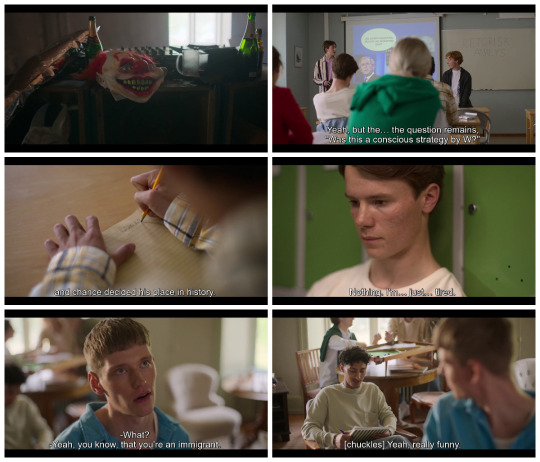
Blink and you miss it: Hey, that's one of the clown masks they used for Wilhelm's initiation back in season 1.
Blink and you miss it: Henry and Valter are doing a class presentation on rhetorical analysis, and for some reason they chose former US president George W. Bush as their subject, which is pretty hilarious given that he was a notoriously bad public speaker.
Blink and you miss it: Instead of asking Wilhelm, who is sitting right next to Simon, how he's feeling, he writes the question in his notebook and slides it over.
Subtext: Gotta keep up that facade and bottle all the negative feelings inside!
Lost in translation: Vincent uses the word "nyanländ", "newly arrived", which is the current politically correct way of saying immigrant.
Subtext: ...but in typical bully fashion he asks the target of the racist "joke" if it was funny, and Marwan obviously lies about it as to not upset Vincent.
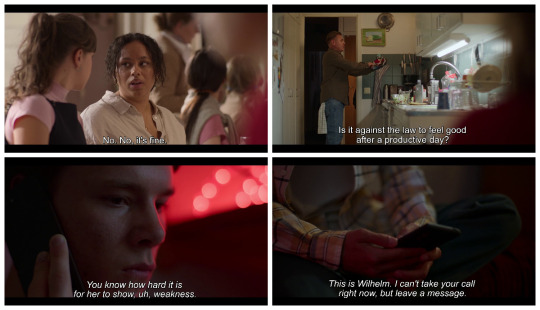
Subtext: Felice tries to play it off as no big deal, but she actually wants this opportunity to spend time with Sara without her other friends, in order to rebuild the friendship.
Subtext: Sara is right to be suspicious of her dad, because he is a lot more energetic than usual, and excuses his behaviour by him simply being in a good mood. It's probably his new medication that kicked in, though.
Subtext: Speaking of having a hard time showing weakness, that's exactly what Wilhelm's been struggling with by not telling Simon how upset he is about having learned that Erik took part in the gay porn initiation.
Subtext: So the whole subplot of the past four episodes was that the school locked up all the phones, and Wilhelm joined the little strike to get them back, pissing Simon off in the meantime, and now that they have their phones back he's not picking up when Simon is calling him? Not cool.
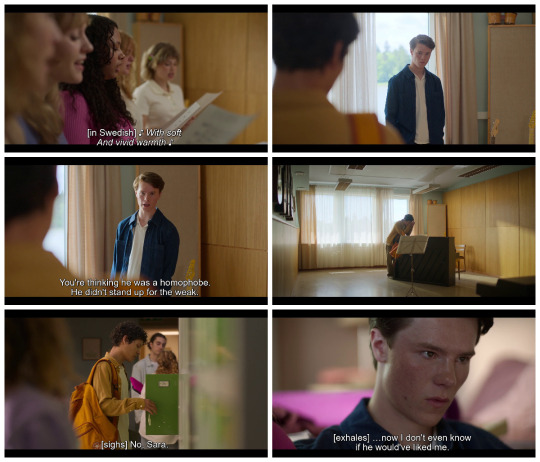
Culture: The choir is practising "En vänlig grönskas rika dräkt", a Swedish hymnal with text from 1889, but this version of the melody is from the 1930's and composed by Waldemar Åhlén. It's a very well-known summer song that pretty much every Swedish schoolkid has sung at some end-of-schoolyear summer assembly.
Cinematography: We're in the cursed music room, and this time the lighting is harsh and sharp, Wilhelm is in stark contrast to the rest of the room, there's no soft golden light smoothing things out, so we're gonna have an argument!
Subtext: Yeah, no, Wilhelm, sweetie, that's projection, that's what you are thinking about your brother. Simon isn't doing anything wrong here, he's just concerned about you being a moody asshole.
Cinematography: To illustrate how the relationship is going south, the music room which used to be full of instruments, is just getting emptier and emptier, and Simon is left standing alone at the piano.
Subtext: No, he's not feeling ok, and no, he's not interested in making up with Sara right now, because he's still angry at her.
Subtext: There are different kinds of homophobia, for example, there are people who talk loudly about how accepting they are of The Gays, but who react negatively when someone close to them comes out, because they were only fine with it at a distance. And then there are people who are ignorantly homophobic in general, but who turn out to be supportive of anyone close to them who comes out, because they know that that person isn't like The Other Gays. Shitty, but less shitty than the first group, and I think that's how Erik would have reacted had he known about Wilhelm.
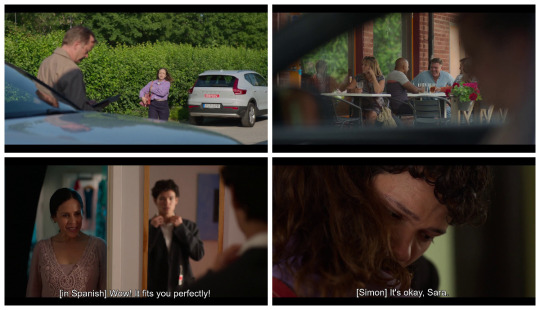
Culture: In Sweden, you do the practical driving test in a car provided by the testing centre to make it fair and equal for everyone. These cars all have a red sticker saying they're for driving tests.
Subtext: Micke is failing exactly how he described it in an earlier episode. He's on new medication, it made him feel good and like he was in control, so he thought he could take just one beer with his friends.
Subtext: No, it fits horribly, and you can clearly see that it was on sale and that the price tag is still on it. But this is what Linda can afford.
Lost in translation: Simon actually says "jag vet", "I know", when Sara tells him that their dad let her down and that she is sad and upset about it.
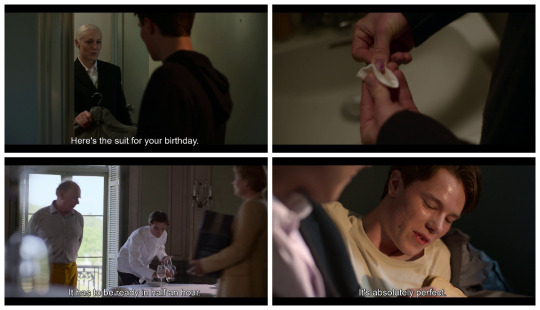
Subtext: Unlike Simon who got a cheap suit on sale, Wilhelm just has his perfectly tailored suit delivered to him by his bodyguards.
Subtext: Last episode Wilhelm picked a sport charity or something that he doesn't actually care about, because he thought it would best fit the narrative the royal court is going for. So now his internal homophobia is screaming at him to remove the nail polish, because it doesn't fit that image.
I don't know what this is: This has got to be an editing goof? This sequence of events doesn't work. Everyone else is up and about, preparing the third year's dinner with the teachers and they're even cooking the food with a chef, but it's early morning and Wilhelm is still sleeping in? Anyway, the whole thing is yet another example of how the school teaches hierarchy. As a younger student you service the older students, and when it's your turn to graduate, someone younger will service you.
Throwback: Aww, Simon made Wilhelm a sandwich, just like Wilhelm made one for Simon a bunch of times in previous seasons.
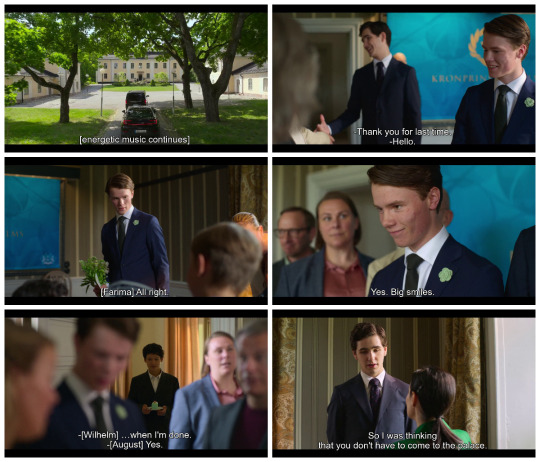
Culture: Man, early summer in Sweden is beautiful, isn't it? This was shot at Åkeshofs Slott in Stockholm, and if you do a 180 turn on that path, you'll see the subway station Åkeshov, and if you go through the tunnel under the road and then up to your right, you'll end up at a sports centre where I went twice a week as a kid for fencing training!
This tumblr is now about French school fencing! Doublé! Riposte!
Subtext: Time and time again the show has shown us how much August loves this shit, and that he wasn't lying when he said he knew everyone, because clearly he does!
Subtext: And to show how much Wilhelm dislikes this shit, he is so stiff when talking to the invited kids who are actually benefitting from his charity foundation, while August just immediately jokes around with them and is much more comfortable.
Culture: I've seen how a lot of fans think that the flower Wilhelm is wearing is a green carnation, which is a symbol for being gay, popularized by Oscar Wilde. I don't think so, that's not a thing in Sweden as far as I know. Instead, I think it's an alternate version of a Majblomma, which is an actual Swedish charity thing, where you can buy these plastic lapel flowers from schoolkids to show your support around this time of year.
Subtext: Even though Simon is there, he's being shoved to the back, because his presence doesn't fit the narrative. If Wilhelm instead had chosen to start some kind of LGBT charity, Simon would have had a much more prominent role. Oh, and poison or not, that Princess Cake looks delicious!
Subtext: Farima is expertly letting August down, who of course pretends that he's not the least bit disappointed at being excluded from having dinner at the royal palace.
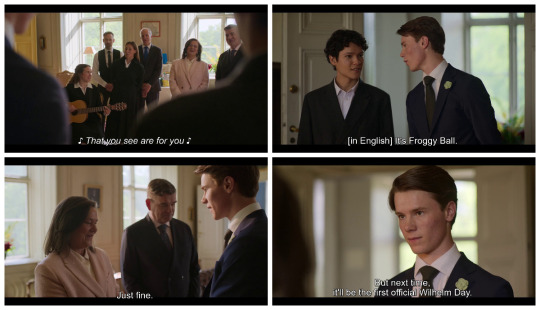
Blink and you miss it: IT'S LISA! HI LISA!
Culture: Kalle Stropp och Grodan Boll are two characters from a radio show for kids from the 1940's, but they've also been featured in books, comic books, a live action movie, and animated cartoons. It's about the two titular characters, a cricket and a frog, and their adventures. The last movie was made in the 1990's though, so I'm not so sure kids these days knows who these characters are. Personally, I can't hear this song without hearing their silly character voices.
Subtext: The Queen is still keeping up appearances and lying through her teeth about how she's actually feeling.
Culture: In real world Sweden, Victoriadagen is celebrated in mid July when Crown Princess Victoria has her birthday, she hands out a sports award, there's a concert, some charity stuff, and you can sort of meet the royals or sing her happy birthday or something.
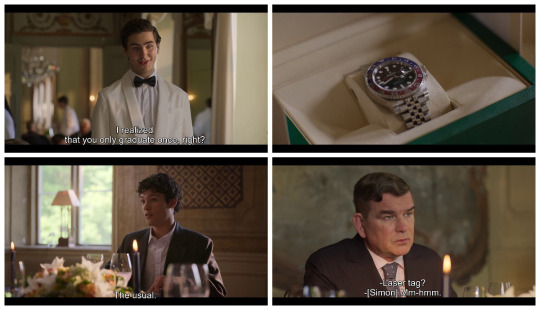
Subtext: August is repeating the excuse Farima used on him as to why he didn't attend the birthday dinner.
Blink and you miss it: That's a Rolex Oyster Perpetual GMT-Master II. It's only about $10,000 and change.
Subtext: Simon, sweetie, I don't think the royals have any clue as to what "the usual" means when you're describing how regular people celebrate birthdays.
Culture: Simon actually says Laserdome, which is a company in Sweden that has been running laser tag arenas since the 1990's. I had no idea they still existed!
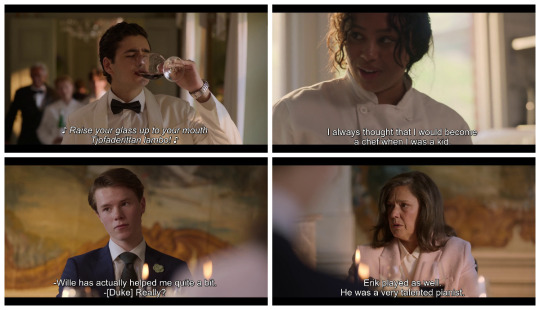
Culture: They're singing Lambo, a drinking song for students. It's a challenge song, so while the rest of the table sings, the target has to finish their glass, correctly sing the response lines, and turn the glass upside down over their head. If you fail, like August does in this scene, you have to do a penalty round and chug another glass.
Subtext: ...before her parents heaped all of their family's expectations on her. But maybe if Felice can break free she could pursue her actual dreams?
Throwback: Remember the scene in S1E3 when Simon is practising the Hillerska song in the music room?
Subtext: Queenie, sweetie, you're not looking Wilhelm in the eyes, you're not engaging in the discussion, and the only thing you do is to talk about Erik every chance you get. No wonder Wilhelm has had enough and explodes at his parents.
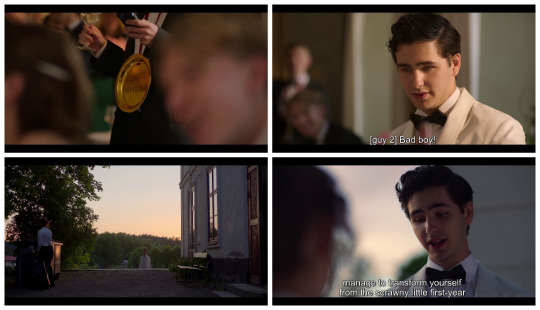
Blink and you miss it: Vincent won the "Daddy pays" award. Pappa betalar.
Subtext: In this context the award just means that he's the image of a bad boy, a player. But throughout the season, August has been struggling with whether or not he's actually a bad person, which is why he's not exactly happy with the award.
Cinematography: Fuck me that's a pretty shot of a typical summer sunset. In late May in the Stockholm area, sunset happens at around 9:30 in the evenings.
Subtext: One more explanation for August's body dysmorphia is that he got bullied for being weak and scrawny when he first started at Hillerska, so he decided to start working out more.
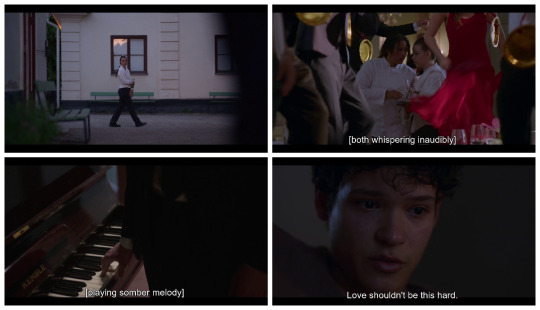
Blink and you miss it: The reason Fredrika is outside and happens to see Sara and August kiss, is because she's trying to sneak away the bottle of wine she stole earlier from the kitchen.
Subtext: And the reason Felice looks upset when Fredrika tells her what she saw is because she truly thought Sara was over August, and that's a condition of them reconciling.
Blink and you miss it: Wilhelm plays the first few notes of the original Hillerska song.
Subtext: And to cap off this terrible no-good horrible cliffhanger episode, Simon breaks up with Wilhelm by repeating the words his mom said to him earlier in the episode.
162 notes
·
View notes
Text

7 notes
·
View notes